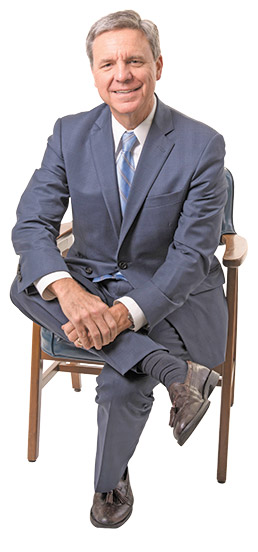Subscriber Benefit
As a subscriber you can listen to articles at work, in the car, or while you work out. Subscribe NowMurray Clark is a self-described “creature of Indianapolis” and has spent much of his life serving the community. He currently is the leader of the Indianapolis office of Faegre Baker Daniels, where he practices in real estate and governmental affairs, representing clients on matters involving alcoholic beverage law, fire code regulations and zoning issues. Murray is dedicated to improving the legal community and is heavily involved in the Indianapolis Bar Association, as well as active with many Indianapolis-based organizations, including the Greater Indianapolis Progress Committee and the Board of Governors of the Riley Children’s Foundation, the fundraising arm for the children’s hospital. He often ends up in leadership positions in organizations because he “always does the hard work and gets things done,” said colleague Tom Froehle.
 (IL photo/Eric Learned)
(IL photo/Eric Learned)You’ve worn many hats in your professional life in addition to being a lawyer – state senator, Republican Party and campaign chairman, candidate for lieutenant governor. How did your law degree help you in those roles?
The law degree was the essential foundation and backdrop for all of these roles and endeavors. It provided me the intellectual background to attack public policy considerations in a more thoughtful and meaningful way.
You’ve spent much of your career making Indianapolis a better community. How do you describe Indianapolis to someone who’s never been here?
We have a small-city mentality that greatly values good-faith collaboration between the private, public, nonprofit sectors, and historically between people of different political and ideological beliefs. Indianapolis is an extraordinarily welcoming community full of hard-working, common-sense solution seekers. And we have benefitted from exemplary political and civic leadership as well. The result is a city that has greatly achieved over the last half-century, particularly in the area of amateur sports and urban/downtown renewal.
Why did you become a lawyer?
The man in my life for whom I have the most respect and admiration, my father, was and remains an attorney. I always wanted to be like him, to emulate him. (That continues to this day, by the way.) The result was that there was never a day growing up that I wasn’t certain I would become a lawyer.
If you couldn’t be a lawyer, what would you do for a living?
Major League Baseball commissioner. I am surprised they haven’t come knocking.
What’s something about you not many people know?
I am an extreme motor racing enthusiast. My son and I enjoy “tracking” our respective sports cars at Putnam Park in Putnam County, Indiana. We have the need for speed.
What will the legal profession look like in 15 years?
The technological advancements will, I suspect, continue to impact the practice of law, perhaps in ways we cannot envision right now and maybe in a fashion more fast and furious than we have witnessed over the course of the last couple of decades. Such a development will likely allow us to accomplish more, for more clients and in quicker fashion. I fear this will lead to a continued leveling of numbers of practicing lawyers. And I suspect paper will be a thing of the past.
What’s something that you wish you could tell your younger self?
Patience my good man, patience.
Why is it important to be active within legal and community organizations?
Simply to give back. I have been so fortunate over the years, as have many of my colleagues. We need to be ever mindful of those not so blessed.
What do you like the most about being an attorney? What do you like least?
Most: The continuing intellectual challenges. I never tire of the dynamic nature of practicing law, and love the fact that while you don’t know exactly what will arise, you can be confident that challenging situations lay ahead. Least: I guess the administrative necessities: the day-to-day activities not specifically focused on the actual practice of law.
What are some tips for achieving a work/life balance?
Never forget the most important things in life: family, faith and friendship. Have the good sense, and in my case actually uncommon good fortune, to marry well. And take a deep breath once in a while.
What was the most memorable job you had prior to becoming an attorney?
Not many. Maybe bailiff for Hon. Frank Huse in Marion Circuit Court, or perhaps bartender at the Edgartown Yacht Club in Martha’s Vineyard, Massachusetts.
Please enable JavaScript to view this content.
